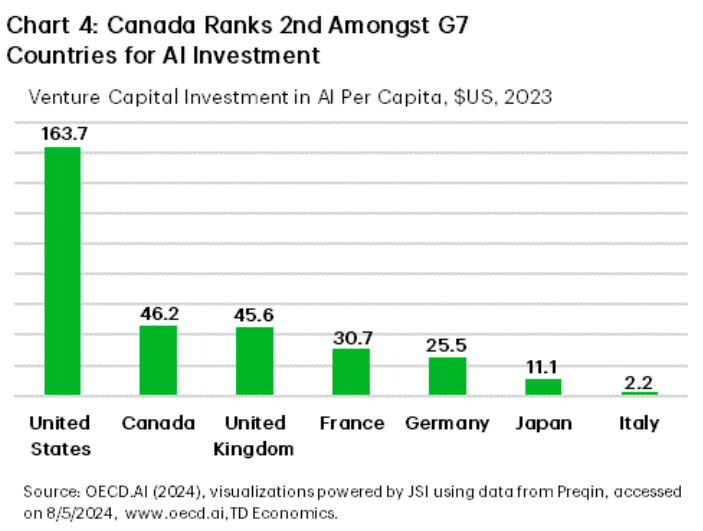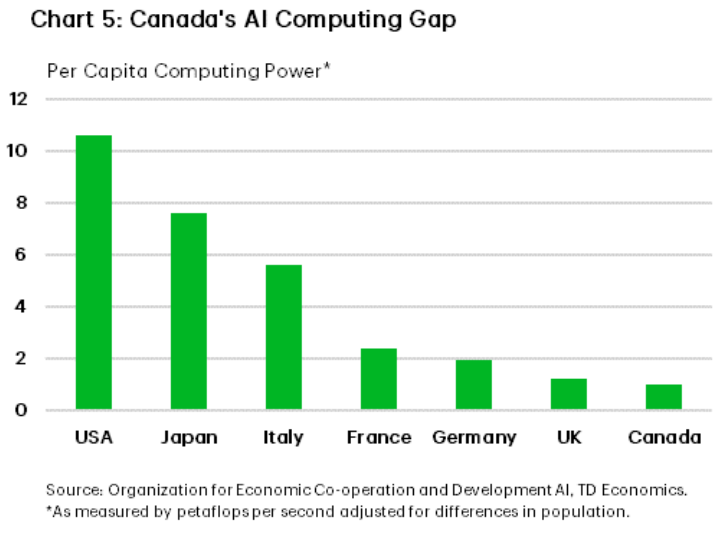
'Early empirical evidence suggest that AI is more complementary to labour than it is displacing'

More Canadian employers should be embracing the use of generative artificial intelligence (GenAI), according to a recent report.
Among Canada’s cognitive sector, about 52% to 68% of workers are likely to be exposed to GenAI, report TD Bank.
But that should not be a cause for worry, according to the report.
“The natural course of the jobs market is to evolve with the creation of new technology. When it comes to the impact of generative AI on employment, early empirical evidence suggest that AI is more complementary to labour than it is displacing,” said TD Bank. “Even as AI displaces some workers, the productivity effect boosts aggregate demand and the increase in demand for workers could dominate the substitution effect.”
Despite most jobs’ exposure to GenAI, the high concentration of cognitive-based occupations in advanced economies means a huge opportunity for complementary roles, according to TD Bank.
“Empirical evidence show that college-educated workers are better prepared to move from at-risk jobs to complementary jobs, thereby bolstering their ability to ride this innovation wave. Canada’s high concentration of highly educated workers suggests that there are reasons for optimism in workers' ability to adapt.”
Overall, based on the share of jobs in AI-complementary occupations and with GenAI adoption ramping up, Canada’s real GDP could be up to 5%–8% higher in the next 10 years compared with the current baseline.
“That implies a 0.5%–0.7% lift to annual-productivity that will help to offset some of headwinds from an ageing workforce,” said TD Bank.
Three in four employees across the world are now using GenAI at work, according to another report.
Despite the positives to be gained, Canadian companies are s;low to adopt GenAI, report TD Bank, citing an IBM survey of more than 8,500 IT professionals in 20 countries conducted in November 2023.
That study found that Canada (35%) is the country that’s least likely to accelerate the rollout of GenAI. Canada is doing worse on that end that Australia (38%) and the U.K. (40%).
Meanwhile, China (85%), India (74%), and the UAE (72%) are the markets most likely to be accelerating AI rollout.
That is the case even though Canada ranks second among G7 countries when it comes to venture capital investment in AI per capita, according to data from the U.S.’s Organization for Economic Co-operation and Development (OECD).

“While Canada has the AI brain and is home to many startup companies, there are several bottlenecks that stifle growth opportunities,” said TD Bank.
These include Canada’s weak computing horsepower, as the country has the lowest per capita compute performance among G7 peers.

Also, “Canada’s low adoption rate may be linked to the fact that small businesses are an important fabric of Canada’s economy. AI usage is less prevalent among small firms and many struggle to scale,” said TD Bank.
Developments in AI can help to answer some of Canada’s productivity woes, but some changes have to be made, it said.
“These technologies will change the way we work, and by helping workers become more efficient, will foster greater economic growth. Canada has a globally competitive AI ecosystem and is well placed to capitalize on this opportunity. However, the extent to which AI technologies can boost growth hinges upon meaningful adaption. To secure our place in global AI ecosystem it is critically important to see more firms embrace the opportunity.”
Canada has seen slower growth in the demand for AI skills in job postings compared to the U.S. and the U.K., according to a separate report from PwC.
Here’s how to prepare workers for the use of GenAI at work, according to Pluralsight: